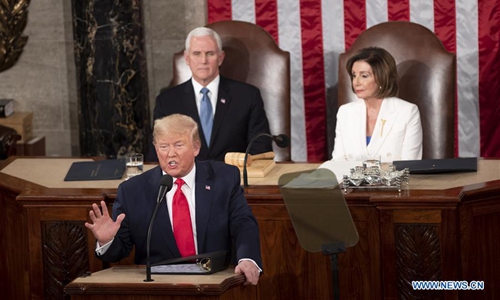HOME >> WORLD
Trump campaign sues The New York Times over quid pro quo story
Source:AFP Published: 2020/2/27 17:18:41

US President Donald Trump delivers his State of the Union address to a joint session of Congress on Capitol Hill in Washington D.C. on Tuesday. Photo: Xinhua
US President Donald Trump's re-election campaign on Wednesday filed suit against The New York Times over an article about links to Russia, the first legal action of its kind after his regular criticism of the "failing" newspaper and other traditional media organizations.
The suit by Donald J. Trump for President, Inc says the Times "knowingly published false and defamatory statements" in the March 27, 2019 column headlined "The Real Trump-Russia Quid Pro Quo." Its author was former Times executive editor Max Frankel.
"There was no need for detailed electoral collusion between the Trump campaign and Vladimir Putin's oligarchy because they had an overarching deal: the quid of help in the campaign against Hillary Clinton for the quo of a new pro-Russian foreign policy," Frankel wrote.
"The Times was well aware when it published these statements that they were not true," the campaign alleged in a document signed by lawyer Charles Harder, without clarifying that the column appeared in the Opinion section, which operates separately from the Times newsroom.
"But The Times published these statements anyway, knowing them to be false, and knowing it would misinform and mislead its own readers, because of The Times' extreme bias against and animosity toward the Campaign," and because of the Times' "exuberance to improperly influence" the 2020 election, in which Trump is running for re-election, it said.
Special Counsel Robert Mueller, who investigated Russian interference in the 2016 election, reported last April that there were numerous contacts between members of Trump's circle and Russia and that the campaign "expected it would benefit electorally from information stolen and released through Russian efforts." But it said the efforts did not amount to criminal conspiracy.
In response to the lawsuit, a New York Times spokesperson said the Trump campaign "has turned to the courts to try to punish an opinion writer for having an opinion they find unacceptable."
Posted in: AMERICAS,WORLD FOCUS,EYE ON WORLD